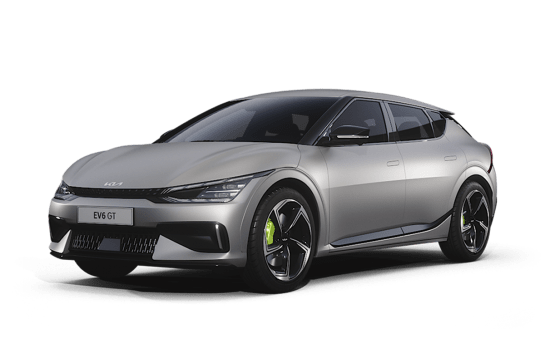
Mercedes-Benz GLC-Class VS Kia EV6
Mercedes-Benz GLC-Class
Likes
- More power and torque
- More fuel efficient
- Stylish cabin
Dislikes
- Misses V8 soundtrack
- Big price rise over previous model
- Smaller boot, no spare tyre
Kia EV6
Likes
Dislikes
Summary
Mercedes-Benz GLC-Class
Let’s make one thing clear from the very beginning - this new Mercedes-AMG GLC63 S E Performance is technically superior to the model it replaces. Whether it’s actually better or not, is the real question at the heart of the matter.
Why? Because, like the C63 sedan stablemate, AMG has opted to replace the previous model’s 4.0-litre twin-turbo V8 engine with a new 2.0-litre four-cylinder hybrid powertrain. It was a move brought about in part because of increasingly stricter emissions standards in Europe, but also ties-in with the German firm’s success in modern Formula One racing.
While the new hybrid system offers more power, more torque and better fuel economy, as the lukewarm response to the C63 has demonstrated, the hard reality for AMG is that its buyers associate it with V8 and even V12 engines. That emotional pull is hard to replace with logic, even if the new model offers technical superiority.
Read more about
- Faster than a Porsche 911 Turbo? 2025 Mercedes-AMG GT63 S E Performance is quickest AMG yet!
- Mercedes-AMG GLC43 2024 review
- 2025 Mercedes-AMG E53 revealed: Bahn-storming petrol-electric hybrid arrives in sedan and wagon form to take on Audi RS6, BMW M5, Maserati Quattroporte Trofeo and Porsche Panamera E-Hybrid
But how does the new powertrain suit the GLC63 - is it just technically better or is it holistically improved?
| Safety rating | — |
|---|---|
| Engine Type | — |
| Fuel Type | — |
| Fuel Efficiency | —L/100km |
| Seating | — |
Kia EV6
Sometimes I think the present is nowhere near as futuristic as I thought it would be when pondering things 20 years ago.
And then there are times when the two cars you’re comparing are an electric Mustang SUV and a 580 horsepower Kia that accelerates faster than a Ferrari Enzo.
Yep, this comparison of the Ford Mustang Mach-E GT and Kia EV6 GT is one of those times when we’re reminded how much things have changed and how quickly we need to accept the changes electric cars introduce as the new normal.
Read more about
Supercar-like acceleration, the dilemma of charging and the premium price they command are key EV attributes. But they are still cars. Still the way we get around.
If they’re SUVs like the Mach-E GT and EV6 GT we need to compare more than just their EV credentials. Practicality, driveability, value-for-money, safety and ownership costs are also hugely important.
And this is what we’ve done here, comparing them not just as electric cars but in all the ways you’ll use them, too.
| Safety rating | |
|---|---|
| Engine Type | — |
| Fuel Type | Electric |
| Fuel Efficiency | —L/100km |
| Seating | 5 seats |
Verdict
Mercedes-Benz GLC-Class7.7/10
Like I said right from the start, this new, hybrid version of the AMG GLC63 is technically superior to the model it replaces in every meaningful way. It is faster, more powerful and more fuel efficient and therefore a better performance SUV than the model it replaces.
Is it a better model than the one it replaces? Ultimately that will come down to how much stock you put into the soundtrack and your feelings on an AMG not powered by a V8 engine.
Because if you can see past that, then the AMG GLC63 is an absolutely fantastic performance SUV. Not only does the new powertrain make it faster in a straight line, but the chassis is very well-balanced, making for an engaging driving experience.
For those who can look past the smaller engine they will be rewarded with an incredibly fast and rewarding-to-drive member of the AMG family.
Note: CarsGuide attended this event as a guest of the manufacturer, with travel, accommodation and meals provided.
Kia EV6/10
The Ford Mustang Mach-E GT wins this comparison with the Kia EV6 GT by a small margin, mainly due to its better practicality, its styling and its lower ownership costs. The Kia EV6 GT is also brilliant in its sporty handling, value-for-money and great battery tech. But if there was one that’s the best all-rounder to live with daily, it’s the Mustang Mach-E GT.
Ford Mustang Mach-E GT | Kia EV6 GT | |
Price and Features | 7 | 8 |
Design | 9 | 8 |
Practicality | 8 | 7 |
Under the bonnet | 9 | 9 |
Efficiency | 8 | 8 |
Driving | 8 | 8 |
Safety | 9 | 9 |
Ownership | 8 | 7 |
TOTAL | 8.3 | 8 |
Design
Mercedes-Benz GLC-Class
The GLC63 is unmistakably an AMG from the moment you first lay eyes on it. That’s thanks to the AMG-specific elements, starting with the grille with vertical strikes and the AMG crest on the bonnet; which is now a signature item for the performance sub-brand.
The GLC63 is also fitted with the Night Package II design kit; this adds a darkened grille and black chrome badging to further enhance its visual appeal.
The AMG-specific alloy wheels and more aggressive stance do mean the GLC63 stands out from the rest of the GLC range, helping it look fast even when it’s standing still.
Kia EV6
Two more different looking SUVs you could not find. Actually, the EV6 GT barely even looks like an SUV although that’s what Kia calls it and the industry classifies it as such.
Have a look at the images, or better still watch the video we made above, to take in the stark comparison between the styling of these vehicles.
The Mustang Mach-E GT looks reassuringly like a Mustang SUV with its vertical bar tail-lights, the muscular rear haunches, blade headlights, shark nose bonnet and big grille.
Well, it’s not a real grille but if you look closely you’ll see the faint outline of honeycomb mesh behind the semi-transparent plastic.
The Kia EV6 GT looks more like a bloated hatchback than an SUV, but you could argue that’s all an SUV is, anyway, I guess.
Still, it’s a stunning design with its pinched in nose, bulbous and smooth panels, looking low, wide and intimidating like a venomous insect complete with lime green brake calipers.
Despite the obvious exterior differences their dimensions aren’t wildly different as you can see in the table below, only the height sets them apart.
If all you had to go with were these figures I’m sure you’d never imagine they’d belong to two very different looking SUVs. The extra height gives the Mustang GT Mach-E a more upright and boxy design, and this affects practicality as you’ll read about further on. For now let's look at their insides on purely stylistic merits.
Of course they have completely different interiors. The Mustang Mach-E GT has a more macho, serious but sporty cabin with high quality feeling fabrics adorning the dashboard and synthetic leather seats. Only the gigantic portrait media display makes this feel like a modern Ford product.
The EV6 GT’s cabin feels dark, like a cave but one filled with expansive screens and tech. There are intriguing patterns etched into the dashboard and deep seats that wrap around their occupants.
Its innards are as alien as its exterior and I’m here for it. And so are many people. Probably not those who like the Mustang Mach-E GT’s cabin, though.
I think the Mustang Mach-E GT pulls off a better look, especially considering the pressure it’s designers would have been under to create an SUV version of one of the most iconic cars on Earth.
Dimensions | Ford Mustang Mach-E GT | Kia EV6 GT |
Length | 4743mm | 4695mm |
Height | 1623mm | 1545mm |
Width | 1881mm | 1890mm |
Wheelbase | 2984mm | 2900mm |
Ford Mustang Mach-E GT | Kia EV6 GT |
9 | 8 |
Practicality
Mercedes-Benz GLC-Class
Inside the GLC63 is clearly a derivative of the rest of the range, with its C-Class-inspired design and layout, but there’s enough AMG-specific elements to ensure it looks and feels special. This starts with the AMG steering wheel, which comes not only with a thick rim wrapped in Alcantara, but also some AMG special dials to adjust the various performance settings for the powertrain, suspension and transmission.
Then there are the AMG-specific seats, which look good and offer good support for the driver and front seat passenger. The rear seats offer decent space for what is a mid-size SUV, with room enough for two adults or teenagers or three smaller kids.
Those in the back aren’t particularly well looked after though, with only rear air-con vents and small door pockets but no USB charging ports or other small item storage.
The boot is 590 litres, down from 620L in the rest of the range, thanks to the addition of the rear-mounted electric motor. There’s also no room for the temporary spare the rest of the GLC range gets and instead you have to make do with a puncture repair kit.
Kia EV6
Electric vehicles have changed practicality for the better. Not being constrained by big engines, transmissions and driveshafts means the packaging can be designed for good storage and people room.
Flat floors open up space, front boots are handy and even the ability to use their colossal battery to power campsites or other appliances is a big plus.
Below is a table comparing boot sizes and power outlets. On the face of it the EV6 GT appears to have the bigger rear boot but the stacking height is lower than the Mustang Mach-E GT’s taller space.
The EV6 GT also has next to no front boot, while the Mustang Mach-E GT has a large storage space under the bonnet.
As for rear legroom, the EV6 GT and Mustang Mach E GT have plenty of space for me at 189cm to sit behind my driving position and headroom is excellent in both.
Entering and exiting the Mustang Mach-E GT is easier due it’s more traditional SUV shape with tall doors and elevated ride height. The EV6 GT is almost 10cm lower overall and I hit my head swinging into the back seat while doing my legroom test.
Both cars have directional air vents in the second row, cupholders, door pockets and USB ports.
Talking of power outlets, only the EV6 GT has a vehicle-to-load (V2L) power outlet which will take a regular household appliance plug.
It’s a tough call as to which is more practical, and while the Kia has the versatile V2L and plenty of space, the Mustang's front boot and ease of entry and exit makes it the winner here.
Ford Mustang Mach-E GT | Kia EV6 GT | |
Seats | 5 | 5 |
Boot capacity (five seats up) | 402L | 480L |
Frunk capacity | 134L | 20L |
Wireless phone charging | Yes | Yes |
USB Ports | 4 | 5 |
V2L socket | 0 | 1 |
Ford Mustang Mach-E GT | Kia EV6 GT |
8 | 7 |
Price and features
Mercedes-Benz GLC-Class
The power and torque figures aren’t the only numbers that have risen sharply, with the GLC63 clearly impacted by a double whammy of inflation and the usual new-car price rise.
The GLC63 now starts at more than $191,814 for the SUV and $198,415 for the Coupe, which represents a nearly $30k increase over the old V8-powered model, which was priced at $164,600 just two years ago. Even for luxury car buyers that’s a big jump, especially when you’re trying to convince people of the merits of the four-cylinder powertrain.
That also means it's more expensive than all of its key competitors, including the BMW X3 M Competition, Maserati’s Grecale and the outgoing, petrol-powered Porsche Macan GTS.
To help explain some of this price increase Mercedes-Benz Australia has opted for a high level of standard specification for local cars. Standard equipment includes 21-inch alloys, AMG composite braking, a panoramic sliding sunroof, a unique AMG steering wheel, power-adjustable sports seats in Nappa leather, a head-up display, dual-zone climate control, wireless smartphone charging and a Burmester 3D Sound system.
Also included is the AMG Track Pace suite, for those who want to unleash their GLC on the racetrack.
There’s also a limited run, AMG Edition 1 Package available too, for an additional $12,900. On the outside you get Manufaktur graphite grey magno paint, foiling with colour gradation and large AMG logo on the sides, an AMG Aerodynamics Package, unique alloy wheels with Edition 1 and AMG branding, yellow brake calipers and an AMG fuel filler cap in silver chrome with AMG lettering.
Inside there’s AMG Performance seats, AMG Nappa leather in black with yellow contrasting stitching, AMG illuminated door sills, carbon-fibre AMG trim highlights, yellow seat belts and a unique AMG Performance steering wheel wrapped in carbon-fibre and microfibre.
Kia EV6
Electric cars are more expensive than their petrol counterparts and generally will be until the cost of EV batteries comes down. This is what drives the manufacturing price up with the extra cost passed onto the consumer. But the good news is the price is coming down.
That news doesn’t really help you much here because the Kia EV6 GT has come down in price and lists for $99,590, before on-road costs. Still, that’s less than the Ford Mustang Mach-E GT which lists for $104,990.
The EV6 GT and Mustang Mach-E GT sit at the top of their respective ranges and have large batteries. That’s the reason for the $100K MSRP. They both come with a lot of equipment and you can see a side-by-side comparison of their standard features in the table below.
What stands out is the lack of powered front seats in the EV6 GT, and also the absence of leather upholstery in both cars.
Both still come with heated seats, excellent sound systems and sunroofs - although the Mustang Mach-E’s is a large panoramic glass version, while the Kia’s is smaller and opens.
The EV6 GT’s head-up display is brilliant, while the Mustang Mach-E doesn’t have one.
The Mustang comes with 20-inch alloys which offer a better ride than the EV6 GT’s 21-inch alloys - but more on that in the driving section further down.
Ford Mustang Mach-E GT | Kia EV6 GT | |
MSRP | $104,990 | $99,590 |
Media Display | 15.2-inch | 12.3-inch |
Instrument cluster | 10.2-inch | 12.3-inch |
Head-up display | No | Yes |
Climate control | Dual-zone | dual-zone |
Auto parking | Yes - in-car | Yes - remote |
Keyless entry/push start | Yes | Yes |
Sound system | B&O 10 speakers | Meridian - 14 speakers |
Sat nav | Yes | Yes |
Sunroof | Panoramic | Slide opening |
Privacy glass | Rear side | Rear side |
Upholstery | Artificial leather | Artificial leather |
Seats | Front: Powered/heated | Front: heated; Rear: heated |
Wheel size | 20-inch alloys | 21-inch |
LED Headlights | Yes | Yes |
Ford Mustang Mach-E GT | Kia EV6 GT |
7 | 8 |
Under the bonnet
Mercedes-Benz GLC-Class
This is what lies at the heart of the AMG GLC63’s success or failure. As I mentioned at the beginning, the previous generation’s 4.0-litre twin-turbo V8 has been replaced by an F1-inspired plug-in hybrid powertrain.
But don’t think that means AMG is suddenly focused on efficiency over performance. When AMG says the powertrain is inspired by the brand’s success in Formula 1 racing, what it means is the battery and electric motor provides a significant performance boost to support the internal combustion engine, not just save fuel.
To that end the combination of the turbocharged 2.0-litre four-cylinder petrol engine and the rear-mounted electric motor produces an impressive 500kW and 1020Nm. That’s a massive jump over the 375kW/700Nm made by the outgoing V8.
Kia EV6
Electric motors make massive amounts of power and torque but the outputs of the Mustang Mach E GT and EV6 GT are beyond 'normal' EVs.
The EV6 GT has a motor driving the rear wheels and another driving the front ones. Together they have a combined output of 430kW and 740Nm with 0-100km/h coming in a brutal 3.5 seconds. That is seriously quick and unnecessary and I love it.
The Mustang Mach E GT also has all-wheel drive thanks to a motor at the front and at the rear but together they make a whopping 358kW and 860Nm, although at 100kg heavier it’s a tad slower to 100km/h with a time of 3.7 seconds. Still these times are quicker than almost any production car from the early 1990s.
Who wins here? I’m calling it evenly matched.
Ford Mustang Mach-E GT | Kia EV6 GT | |
Combined motor output | 358kW/860Nm | 430kW/740Nm |
Drive wheels | AWD | AWD |
0-100km/h | 3.7 seconds | 3.5 seconds |
Ford Mustang Mach-E GT | Kia EV6 GT |
9 | 9 |
Efficiency
Mercedes-Benz GLC-Class
Mercedes makes no secret that the battery is designed for performance, not saving fuel. It only has a 14km EV range but can recharge quickly on the move to provide a power boost when needed.
But despite all that, the GLC63 is actually significantly more fuel efficient than the old V8, using a claimed 7.3L/100km, which is a massive 4.9L/100km improvement over the old model. Although, on our day-long test drive we didn’t manage to come close to that claimed figure and instead saw returns around 11L/100km, albeit after a lot of spirited open-road driving.
Kia EV6
There’s so much to tell you here and the table below will help with understanding the capacities, ranges and consumption of the EV6 GT and Mustang Mach-E GT.
The Mustang Mach-E GT has the larger battery and the longer range, but the EV6 GT’s battery has a much faster DC charging rate.
The Kia can make full use of a 350kW fast charger while the Mach-E can’t accept more than 150kW. You can see the charging times in the table.
Energy efficiency is crucial to an EV’s range and in our test we filled the batteries of the Mustang Mach-E GT and EV6 GT to 100 per cent and drove a 180km route made up of CBD traffic, motorways, suburban streets and country roads.
At the end of the trip we found both used almost exactly the same amount of electricity at nearly the same rate. The difference being the Mustang had more projected range left because its battery is larger.
Who wins? Well, this is really about energy efficiency and we found that both were a good match for electricity consumption. So, let’s call it a tie. You could argue the Mustang Mach-E GT has more range, but the rebuttal would be the EV6 GT’s super-fast charging time.
Ford Mustang Mach-E GT | Kia EV6 GT | |
Battery capacity | 91kWh | 77.4kWh |
Estimated range | 490km | 424km |
Max DC charging speed | 150kW | 350kW |
DC 10-80 percent charge time | 45 minutes | 18 minutes |
Max AC charging speed | 10.5kW | 10.5kW |
Official combined consumption | 21.2kWh/100km | 20.6kWh/100km |
Distance (energy test)) | 176.5km | 178.0km |
Electricity used | 32.6kWh | 32.18 |
As tested combined consumption | 18.5kWh/100km | 18.1kWh/100km |
Ford Mustang Mach-E GT | Kia EV6 GT |
8 | 8 |
Driving
Mercedes-Benz GLC-Class
Anyone who still believes in the adage ‘there’s no replacement for displacement’ hasn’t driven a modern turbocharged and hybridised engine. The GLC63 is a demonstration of the metaphorical and literal power of modern technology, combining an extremely efficient and potent internal combustion engine with an electric motor to make enormous real-world performance.
To be blunt, the GLC63 feels like a rocketship out of corners, launching with a ferocity and relentlessness the old V8 simply can’t match. It shouldn’t come as a surprise, a mid-size SUV with 1020Nm was always going to have plenty of performance, but even so it’s a shock to the system every time you give the GLC63 full throttle. Officially AMG claims it takes just 3.5 seconds to run 0-100km/h and has an electronically limited top speed of 275km/h - mighty impressive figures for a five-seat mid-size SUV.
To help get all that torque to the road, AMG deploys torque distribution technology that allows for it to be split an even 50/50 front/rear all the way to 100 per cent to the rear tyres.
Other technologies deployed to enhance its handling include AMG Ride Control suspension with adaptive damping and rear-axle steering. There’s also eight AMG Dynamic Select driving modes and four AMG Dynamics settings (Basic, Advanced, Pro and Master), so it’s a complex vehicle that is designed for the enthusiast.
While it’s easy to drive around town, once you get out on the open road you can really get a sense of the GLC63’s performance potential. Beyond just its powertrain the suspension offers good body control and the rear-axle steering helps it feel agile and responsive.
It’s not perfect though. At times the complexity of the system does lead to some hesitation when you put your foot down. It certainly lacks the linear power delivery of the old V8 and makes for a slightly trickier driving experience at times.
As for the sound, which is one of the biggest elements missing from the V8, Mercedes has added AMG Real Performance Sound, which features a pressure sensor in the exhaust that picks up on the engine note and plays it through the speaker system. It certainly helps make for a louder, more noticeable engine noise, but it still sounds more like an A45 than the previous GLC63 and for many would-be buyers, that’s a major turn-off.
Kia EV6
The way these SUVs feel to drive is as different as their looks. The Mustang Mach-E GT feels more suited to daily driving while the EV6 GT is our pick for the race circuit or sporty blasts on nice country roads with plenty of twists and turns.
Both have drive modes ranging from the hardcore 'Untame' in the Mach-E and 'Sport+' in the EV6 GT to the calmer 'Whisper' and 'Normal' modes in Ford and Kia, respectively.
Adjustable suspension in both firms up the ride for better handling and softens it for a more comfortable setting.
The Mustang Mach-E has the more comfortable ride overall compared to the EV6 GT which is very firm in its Sport+ drive mode but still overly hard in the Normal setting thanks to the big wheels and low-profile tyres. That said, the Mach-E GT is prone to jiggling too much over minor bumps.
The EV6 GT and Mustang Mach E GT can accelerate incredibly fast and while it's fun, the ability to move quickly is useful in overtaking and at intersections without traffic lights.
Neither the EV6 GT not Mach-E GT offer exceptional ride comfort but the Mustang delivers a better all around driving experience with good visibility, a more elevated driving height and supportive seats.
Ford Mustang Mach-E GT | Kia EV6 GT |
8 | 8 |
Safety
Mercedes-Benz GLC-Class
The GLC63 comes standard with a comprehensive suite of safety features including 'Distronic' (Mercedes’ name for adaptive cruise control), 'Active Lane Keeping Assist', 'Blind Spot Assist', 'Traffic Light Assist' and 'Adaptive Highbeam Assist'. It also includes Mercedes’ 'Pre-Safe' accident anticipation system - which pre-tensions the seat belts and will even play a white noise to protect your ears if it senses a crash is imminent.
A parking system that includes a 360-degree camera and active parking assist is also included.
The GLC range was awarded a five-star ANCAP rating in 2022, which pre-dates the latest testing protocols, so doesn’t provide a like-to-like comparison for vehicles tested after that date.
Kia EV6
The Mustang Mach-E GT and the EV6 GT have been awarded the maximum five star ANCAP rating but the Kia was tested more recently under 2022 criteria.
Both cars have ISOFIX points for child seats in the outside rear seats, while there are three top tether anchor mounts in the second row, too. The table below compares their advanced safety tech.
Ford Mustang Mach-E GT | Kia EV6 GT | |
ANCAP rating | 5 (2021) | 5 (2022) |
AEB | Pedestrian, vehicle, cyclist | Pedestrian, vehicle, cyclist |
Lane Keeping Assist | Yes | Yes |
Blind Spot Warning | Yes | Yes |
Rear Cross Traffic Alert | Yes with braking | Yes with braking |
Airbags | 7 (no centre airbag) | 6 (no centre airbag) |
Ford Mustang Mach-E GT | Kia EV6 GT |
9 | 9 |
Ownership
Mercedes-Benz GLC-Class
The GLC63 is covered by Mercedes Australia’s usual five-year/unlimited kilometres warranty.
As for maintenance, Mercedes offers service plans, spanning three to five years. Three years will cost you $5025, $6455 for four years and five years is priced from $7180. Servicing intervals are 12 months or 20,000km, whichever comes first.
Kia EV6
The final piece of this comparison puzzle is the ownership costs. The table below highlights the difference in what you’ll pay to service with the Mustang Mach-E GT proving to be the more affordable.
The Kia comes with a longer warranty, although Ford’s battery coverage duration is better.
The Mustang Mach-E GT wins here for its more affordable capped price servicing.
Ford Mustang Mach-E GT | Kia EV6 GT | |
Warranty | Five-year/unlimited km | Seven-year/unlimited km |
Servicing cost total over five years | $780 | $1561 |
Service interval | 12 months/15,000km | 12 months/15,000km |
High-voltage battery warranty | Eight-years/160,000km | Seven-years/150,000km |
Ford Mustang Mach-E GT | Kia EV6 GT |
8 | 7 |


























































